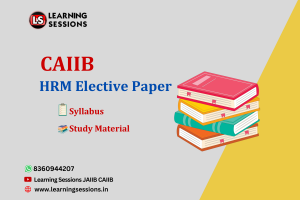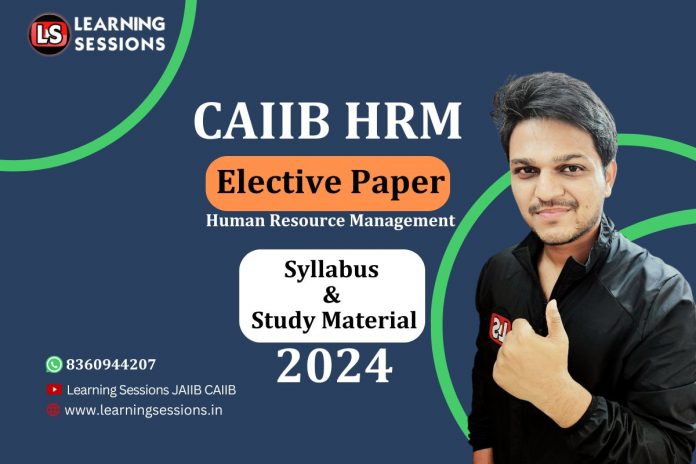Human Resource Management HRM is the second paper of the CAIIB Exam Elective subjects. IIBF will conduct the CAIIB elective subject exam on 27th July 2024 and 15th December 2024. Candidates need to choose only one elective subject out of five. In this article, we will discuss the complete syllabus, exam dates and study material of the CAIIB HRM paper.

📚 CAIIB Study Resources 📚
👉 Check Here
👉 Check Here
👉 Check Here
👉 Get Tests Here
👉 Check Here
👉 Click Here
👉 Click Here
CAIIB HRM Elective Paper Syllabus 2024
Module A
Module A: Human Resource Management
|
|
|
Fundamentals of HRM |
Fundamentals of HRM; New Insights into HR Management; Ethics in Human Resource Management (HRM) |
|
Organisational Behaviour |
Behavioural Dynamics in Organisations; The Person – Job Fit; Group Dynamics; Leadership and Team Effectiveness; Some Contemporary Approaches to Leadership; Transformational Leadership; Human Resource Implications of Benchmarking; Quality Initiatives in Organisations; ‘Quality Circle’: A HR Strategy to Quality Improvement; ‘Six Sigma’: A Model for Improving in Business Processes; Positive Attitude: The Core Behavioural Capital of Organisations; Stress Management; Business Etiquettes |
|
Organisational Change |
Change and Development; Change Agent; Managing Change; John P Kotter’s eight steps to successful change; ‘Responsibility Charting’ |
|
HRM in Indian Banks |
Traditional Role of HRM in Indian Banks; Expectations from HR Department; Changing Profile of ‘HRM’ in Banks; Major HRM Challenges Facing Banks; Core Banking and People Challenges |
|
Knowledge Management |
Concept of Knowledge Management (KM); Significant Features of Knowledge Management; Knowledge Management in Banks; IT & Database Management |
Module B
Module B: Building an HR Strategy
|
|
|
HR as a Strategic Player |
HR as a Strategic Player & Strategic HRM; HR Strategy Formulation and Implementation; Need for a Distinctive HR Strategy; Creating Business Value Through HR Strategy; ‘Factor Analysis’ in HRM; Connecting ‘Strategy’ to Organisations; Strategy Execution; Aligning HR System with Decision Framework |
|
CEO and his/her Team |
Roles and Responsibilities of CEO; CEO and Talent Management; Executive and Line Managers; Succession Planning; ‘Job Family’: An Integrated Model for Sustained Succession Planning & Talent Management; Human Resource Audit |
|
Communication |
Organisational Communication; Types of Communication; Barriers to Effective Communication; Steps for Effective Communication; HR and Communication |
|
HR Functions |
Human Resource Planning (HRP); Recruitment and Selection; Impact of Technology on Critical HR Functions; ‘Social Media Policy’ for Organisations: Need and Contents thereof; Compensation; Incentive-Based Compensation; Attrition/Turnover Management; Employee Risk Assessment Systems in Banks |
|
Performance Management |
Performance Management System (PMS); Performance Appraisal System; 360-Degree Appraisal; Competency Mapping; Key Result Areas (KRAs) |
Module C
Module C: Motivation, Training and Skill Development
|
|
|
The Learning Process |
Human Implications of Organisations; The Learning Theory; The Learning Process; Employee Behaviour |
|
Employee Motivation |
Types of Motivation; Motivational Theories; Employee Attitude Development; Practical Applications of Motivation; Job Enrichment; Job Enlargement; Job Rotation; Job Satisfaction |
|
Employee Development |
Basic Objectives of ‘Training’; Training & Development: Its Need; Concepts and differences of ‘Training’, ‘Development’ and ‘Learning’; ‘Training Need’: Methods for Identification of Training Needs; Role and Impact of Training; Changing Face of Banking in India; Future of Bank Education in India |
|
Training Methodology |
Subject Matter of Training: ‘Learning Organisations’; Training Methodology; Current Trends in Training; Types of Training; Benefits of Training; Training & Career Development; Soft Skills Training; Challenges in Training in Banks; Training Infrastructure in Banks; Talent Management; Creative Talents & Dynamic Leadership: A Winning Combination; Strategies to hone up Leadership Skills; Training for the New Generation; Return on Investment (RoI) on Training; Measuring the Success of Training; Best Practices in Training to Help Organisations |
Module D
Module D: Personnel Management and Industrial Relations
|
|
|
Industrial Relations (Part A) |
Personnel Function; Legal Aspects of Personnel Function; Legislation on Working Conditions; Industrial Relations Code 2020; Legislation on Wages; Legislation on Social Security; Legislation on Employment and Training; The Changing Scenario |
|
Industrial Relations (Part B) |
Historical Background of Trade Union Movement; Trade Unions in Banks; Industrial Relations; Collective Bargaining |
|
Employee Discipline (Grievance Redressal and Discipline) |
‘Grievance’: Concept and Definition; Causes & Effects of ‘Grievance’; Grievance Redressal Mechanism; Conflict Management; Management Dilemma |
|
Workers’ Participation in Management (WPM) |
‘Participation’: Concept & Definition, Types; Methods of Participation; Indian Banking Experience on Workers’ Participation in Management (WPM) |
|
Employee Discipline (Discipline Management) |
Discipline at Workplace; Discipline Management; Disciplinary Rules in Banks; Domestic Enquiry; Frauds in Banks; The Risk Attached to Delegation of Financial Powers; Need for Vigilance Department in Banks; Diversity and Gender Issues; Dealing with Cases of Sexual Harassment; The Sexual Harassment of Women at Workplace (Prevention, Prohibition and Redressal) Act, 2013 (POSH ACT) |
Module E
Module E: Emerging Scenario in HRM
|
|
|
Contemporary Practices in Employee Engagement |
Concept and Definition of ‘Employee Engagement’; Various features and characteristics of ‘Employee Engagement’; Drivers of ‘Employee Engagement’; Need for creative strategies for engaging Gen ‘Y’ Employees; Contemporary ‘Employee Engagement’ strategies; ‘Work From Home’: Emerging New Normal in Organisations; Strategies to Keep Employees Engaged When They are Working From Home (WFH); ‘Hybrid Model’ of working: Unifying the Physical and Virtual; ‘U-Work’ & ‘Ópen2u’: New and Novel Employment Models; Legal Frame-Work in India to Regulate New Models of Work |
|
Organisational Culture & Creativity: New Imperatives |
Definition and Characteristics of ‘Individual Culture’ and ‘Organizational Culture’; Concept and Features of ‘Individual Creativity’ and ‘Organisational Creativity’; Distinction between ‘Creativity’ & ‘Innovation’; Impact of ‘Culture’ on ‘Creativity’ and Vice-Versa in Organisations; Essential Qualities of a ‘Creative Leader/Manager’; Strategies to Create ‘Ethical Organizational Culture’ |
|
‘Corporate Sustainability’ & ‘Green HRM’: A Social & Environmental Approach to People Management |
Concept of ‘Corporate Sustainability’; Evolution from ‘Strategic HRM’ to ‘Sustainable HRM’; Various Forms of ‘Sustainable HRM’; ‘Green HRM’: An Environmental Approach to HRM; ‘Green HRM’ Practices in Banking Industry: Possibilities and Prospects; The Way Forward |
|
‘HR Analytics’, ‘HR Entrepreneurship’ & ‘AI-Based HR Solutions’: New HR Trends for Future |
Future ‘HR Analytics’: Conceptual Understanding; ‘HR Metrics’ vs ‘HR Analytics’; Advantages and Disadvantages of ‘HR Analytics’; ‘HR Entrepreneurship’: The future Buzzword; Introduction to ‘Artificial Intelligence’; Role of ‘Artificial Intelligence’ in HR Functions |
|
Leading in a ‘VUCA’ & ‘BANI’ Scenarios: New Approaches in ‘Crisis Management’ |
‘Crisis’: Concept, Definition, Features & Sources; ‘Crisis Management’: Concept, Features & Need; Four Levels of ‘Uncertainty’: Strategies to Manage; ‘VUCA’: Gravity-Driven Approach to ‘Uncertainty’ and ‘Crisis Management’ in Organizations; Evolution of ‘BANI’ Approach in Crisis Management; ‘VUCA’ or ‘BANI’: Which is to be the Vision for Organisations to Deal with the Crisis?; Typical Models of ‘Crisis Management’ Process; Role of HR in ‘Crisis Management’ Process; Leadership Role in ‘Crisis Management’; Role of Employees in ‘Crisis Management’ |
|
‘Business Ethics’, ‘Corporate Governance’ & ‘Corporate Social Responsibility’: A Winning Combination for Organisational Excellence |
‘Business Ethics’: A Treasure of Trust; Areas of ‘Business Ethics’; Theories of ‘Business Ethics’; Characteristics of an ‘Ethical Organisation’; ‘Corporate Governance’: Shareholders’ Primary; Major Best Practices for Improving ‘Corporate Governance’; Ethical issues in ‘Corporate Governance’; ‘Corporate Social Responsibility’(CSR): A Resolve Towards Commitment to ‘Business Ethics’ & ‘Social Wellbeing; Various Models of ‘Corporate Social Responsibility’; ‘Corporate Social Responsibility’: Indian Experience |
CAIIB HRM Elective Paper Study Material 2024
CAIIB HRM Video Series
Our CAIIB HRM Video series consists of 45+ videos of all modules covering all the chapters and concepts for a comprehensive understanding of candidates. These videos are beneficial for candidates to prepare for the HRM paper as these videos are prepared and delivered by our experts with sound experience. Candidates are recommended to prepare for the CAIIB HRM paper through these videos for effective preparation.
CAIIB HRM Case Studies and Previous Year’s Questions
Case studies and previous years’ questions are very important for the preparation of the CAIIB HRM paper.
Case studies are prepared with examples, illustrations and explanations for the in-depth understanding of the difficult concepts.
Previous year’s questions provide insight into the exam pattern, and question types and help candidates structure their preparation accordingly. Practising with the previous year’s questions helps in improving time management and exam strategy and building confidence.
CAIIB HRM PDF Notes
PDF notes are important for revision purposes and can be assessed from anywhere. Our chapter-wise prepared CAIIB HRM PDF notes ensure comprehensive coverage of all topics and are prepared with the latest CAIIB syllabus enabling candidates to optimise their preparation for success in the CAIIB exam.
CAIIB HRM Mock Tests
Mock Tests provided by Learning Sessions are Mock Tests that are always updated with the latest exam pattern. Our CAIIB HRM mock tests provide questions of various difficulty levels for intense practice.
CAIIB HRM Elective Paper – Syllabus Priority Video
So, this is all about the CAIIB HRM elective paper. Now it is the candidates’ time to start preparing for the exam. Hopefully, with the information provided in the article, the exam preparation journey will be easy for you. And you take full advantage of the study material provided by Learning Sessions.
CAIIB HRM Elective Paper FAQs
Q1. How many modules are in the CAIIB HRM elective Paper?
There are 5 modules in the CAIIB HRM elective paper-
Module A: Human Resource Management
Module B: Building an HR Strategy
Module C: Motivation, Training and Skill Development
Module D: Personnel Management and Industrial Relations
Module E: Emerging Scenario in HRM
Q2. What are the CAIIB HRM elective paper exam dates in 2024?
27th July 2024
15th December 2024
Q3. How many questions are in the CAIIB HRM elective paper?
100 questions
Q4. Where can I get the study material for the CAIIB HRM elective paper?
There are many online platforms which provide CAIIB HRM study material including books, free PDFs, videos, EPDFs, mock tests etc.
Q5. Are case studies included in the CAIIB HRM elective paper?
Yes, the paper has case studies as per the IIBF syllabus 2024.
Q6. What is the full form of the CAIIB paper elective HRM?
Human Resource Management
Also Like:





